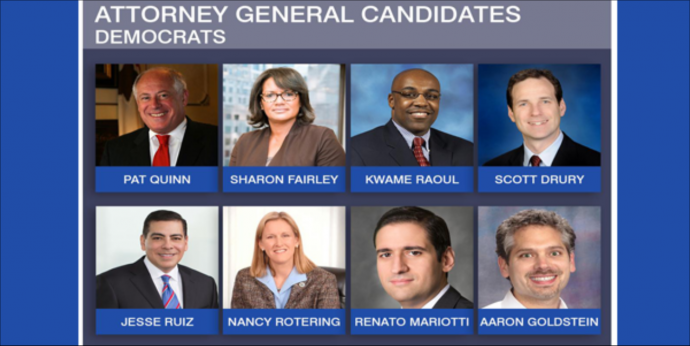There are more Democratic Party candidates for attorney general (8) than there are for governor (6). Speaker Michael Madigan’s daughter, Lisa Madigan, retiring after the end of her fourth term, has held the office since first being elected in 2002.
The candidates are State Rep. Scott Drury, Sharon Fairley, Aaron Goldstein, Renato Mariotti, State Sen. Kwame Raoul, Nancy Rotering, Jesse Ruiz, and former governor Pat Quinn. (There are two candidates on the Republican side: Gary Grasso and Erika Harold.)
Tell me if you’ve heard this one: Why did the Illinois Democrat run for Attorney General? To fight corruption. No, seriously. In a recent appearance before the Chicago Tribune editorial board, most of the candidates stressed the need for the office to be used more often to go after political and governmental corruption.
A few made sure to stress who the real culprits are. The two biggest threats to “our way of life,” of course, are corporations and President Donald Trump. Trump, according to what appeared to be a consensus in the group, is a tyrant, attacks the U.S. Constitution, and is a danger to both the environment and immigrants. Clearly, many Illinois Democrats suffer from Trump Derangement Syndrome.
A good part of the discussion focused on the powers of the AG’s office as currently constituted and whether statutes were needed to amp up the AG’s corruption-fighting powers. Scott Drury said that the state constitution’s description of the Illinois Attorney General is “vague”:
The Attorney General shall be the legal officer of the State, and shall have the duties and powers that may be prescribed by law.
Drury said that “duties and powers that may be prescribed by law” usually is a reference to common law, so the AG already has the powers needed to go after corruption. That state statutes that outline fifteen duties of the AG can be read here.
As an example of the type of rhetoric being used by the candidates is found on Drury’s website. He touted his decision to not vote for Madigan as speaker, and his website contains these paragraphs under the heading “It’s Time To Clean Up Illinois”:
For too long, Illinois has been defined by corruption and self-dealing. Illinois deserves an Attorney General who will restore people’s trust in government and act as a check to the corrupt and unjust forces that threaten our well-being and drag Illinois down.
As a federal prosecutor, I successfully prosecuted corrupt public officials and fought to remove guns and violent criminals from our streets. As a state representative, I have led the charge on police reform, stood-up to Mike Madigan and other political insiders and pushed for tougher ethics and anti-corruption laws.
Some of us would argue that a lot of what is “legal” when it comes to the use of taxpayer dollars is corrupt. The need for tougher ethics and anti-corruption laws in Illinois is immense. There was also some talk about the need for the AG to investigate the property tax system. The Tribune ran a series of articles about Cook County’s property tax system last year.
At times the discussion before the Trib editorial board got heated, with candidates raising their voices, exchanging charges, and attempting to interrupt or talk over one another.
Pat Quinn, who is 69, was hammered by 41 year old Renato Mariotti for having held office since Mariotti was a little boy. Wikipedia notes that Quinn “was first put on the political map in the late 1970s by leading a petition to amend the 1970 Illinois Constitution with the ‘Illinois Initiative.’” You can read more about Quinn’s exploits here.
There was some delicately voiced criticism of Lisa Madigan’s tenure, calls for more open and honest government, and the need for integrity and transparency. State government, run by Democrats for most of the past two decades, needs to regain the public’s trust according to the Democrats running for Attorney General.
This sentence from Wikipedia nicely sums up the state AG’s job:
The state attorney general in each of the 50 U.S. states and territories is the chief legal advisor to the state government and the state’s chief law enforcement officer.
The need for an independent-minded individual to hold the office is obvious. Illinoisans have for decades suffered due to their state’s high ranking in corruption studies.
The Illinois Policy Institute ran a report a few years ago about a study that ranks both illegal and legal corruption. As usual, Illinois was in the top five most corrupt on both counts.

